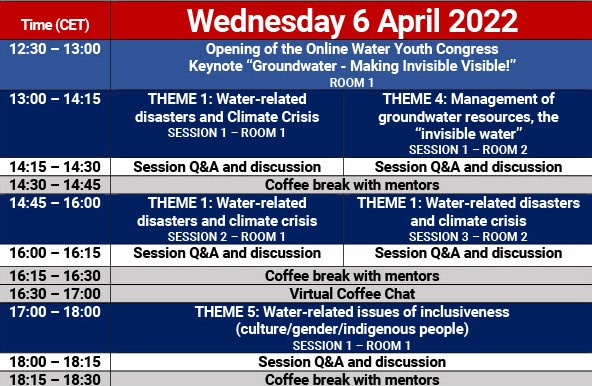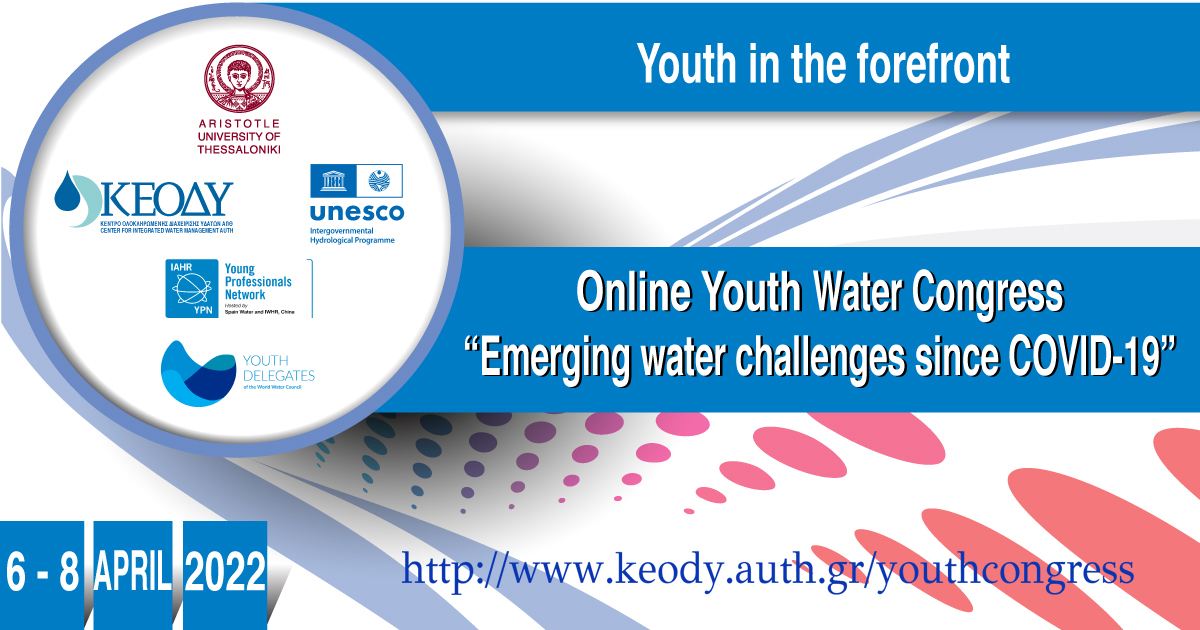“Youth” in the forefront: before and after World Water Forum. Online Youth Water Congress: “Emerging water challenges since COVID-19” | Day 1 (6 April 2022)
Keep me updated Main page Registration Room 1 Registration Room 2

Day 1: Wednesday, 6 April 2022
Opening of the Online Water Youth Congress
Room 1
12:00 - 12:30 CET
Abou Amani, Director of the Division of Water Sciences at UNESCO. Secretary of the Intergovernmental Hydrological Programme
Haralambos Feidas, Vice-Rector Finance Planning and Development, Aristotle University of Thessaloniki
Elpida Kolokytha, UNESCO Center on Integrated Multidisciplinary Water Resources Management AUTh
Tom Soo, Executive Director IAHR
Philip Kruse, Youth Delegate to the World Water Forum
Moderator: Karishma Asoodani, Youth Delegate Asia and the Pacific to the World Water Council
Keynote lecture "Groundwater - Making Invisible Visible!"
12:30 - 13:00 CET
Neno Kukurić, International Groundwater Resources Assessment Centre (IGRAC)
Dr Neno Kukurić is a hydrogeologist with > 30 years of experience gained worldwide, working as a field hydrogeologist, consultant, scientific researcher and project manager. His professional interest is international water cooperation and application of informed management, encompassing technical, socio-economical, institutional and political aspects of water-related issues. From 2011 until 2022, he served as a director of IGRAC. This year, Neno Kukurić is co-coordinating the UN-Water Task Force on World Water Day and Groundwater Summit.
IGRAC
THEME 1: Water related disasters and Climate Crisis
Session 1 - Room 1
13:00 - 14:30 CET
Chair Mentor: Daisuke Nohara Kajima - Technical Research Institute, Japan
Chair Mentor: Athanasios Loukas - Aristotle University of Thessaloniki, Greece
OC Member: D.Latinopoulos
How much is sufficient? Assessing land use change impacts to improve water quality
Gebiaw Ayele
Evaluation of Aksu Stream water quality under the influence of anthropogenic pollution and climate change
Seçil Tüzün Duğan and Ayşe Muhammetoğlu
Urban floods: the microbial risk to human health
Sophie Scutt, James Shucksmith, Henriette Jensen, Jacqueline Diaz-Nieto and Isabel Douterelo Soler
Communicate Science and Politics: The Making of Boundary Work in WASH Project
Arga Pribadi Imawan and Dias Prasongko
The impact of SUDS implementation in the water metabolism of an urban catchment
Luma Gabriela Fonseca Alves, Maria Eduarda Veiga and Carlos Galvao
From monitoring pollutants dynamics in the catchment to the development of Ecohydrological Nature-based Solutions
Paweł Jarosiewicz and Maciej Zalewski
Assessment of climate change impact on surface water regime in Serbia
Borko Radivojevic, Aleksandra Ilic, Dragan Radivojevic and Milan Gocic
Resilience of Urban water Supply Systems to Climate Change in Cameroonian Cities
Suiven John Paul Tume
Session 2 - Room 2
14:45 - 16:15 CET
Chair Mentor: O.O. Yaya , UNESCO water-specialized Center, Nigeria
Chair Mentor: Capuccine Dupont - UNESCO IHE, The Netherlands
Chair Mentor: Mustafa Samad, Bechtel Coorporation USA
OC Member: Karishma Assodani
COD Fraction as Means of Enhancing Wastewater Treatment – South Africa Based Case study
Thandeka Jwara
Antibiotic Resistance and Biofilm Formation Potentials of Plesiominas shigelloides from Selected surface waters in Southwestern, Nigeria
Oluwarinu Adepoju, Mary Bisi-Johnson and Modupe Adesiyan
The effects of the combination of Chlorella and Lemna minor on Textile Industry Wastewater Treatment
Kais Fedhila, Ibtissem Chakroun, Rzigha Hichem, Amina Bakhrouf and Ridha Mzoughi
Computer simulation of leakage water flow in pipes
José Gescilam Sousa Mota Uchôa and Iran Eduardo Lima Neto
Study on post Environmental, Economical and Socio cultural effects to the Sri Lankan western coastal belt due to X-press pearl disaster
Sakila Lakshan and Tharinda Denagama
Debris flow monitoring and assessment using UAV, South-West Tajikistan
Mustafo Safarov
Analysis of COVID-19 Biomedical Waste Generation in India and its impact on water Resources
Ravi Kant Bhardwaj, Manish Kumar and Deepak Kumar
Session 3 - Room 2
14:45 - 16:15 CET
Chair Mentor: R. Teegavarapu - Florida Atlantic University, USA
Chair Mentor: Jovan Despotovic, University of Belgrade, Serbia
OC member: Elpida Kolokytha
Groundwater potential zones mapping of nakak sagar catchment using gis, remote sensing and mif technique
Aishwarya Awari
Analysis of the influence of socioeconomic variables on urban water demand
Tereza Margarida Xavier de Melo Lopes, Antonio Duarte Marcos Junior, Samiria Maria Oliveira da Silva and José Gescilam Sousa Mota Uchôa
Estimation of On-Farm Carbon and Greenhouse Gas Emissions across spatially and climatically variable locations in Texas
Katherine Villalta, Sara Davila, Anoop Valiya Veettil, Ripendra Awal and Ali Fares
Comparison of removal performance of SARS-CoV-2 in wastewater by membrane bioreactor and conventional activated sludge processes
Rongxuan Wang, Md. Alamin, Shohei Tsuji, Hiroe Hara-Yamamura, Akihiko Hata, Bo Zhao, Masaru Ihara, Hiroaki Tanaka and Ryo Honda
Ocean and water bodies protection
Kalamai Wongibe, Dubila Trecy and Emily Kongla
Ecohydrology for Sustainable Water Resources Management and Climate Change Adaptation: A need for Intensive Youth Mobilization
Antidius Raphael
Flooding prevention at Balearic Islands, Spain
Llatas Palomero
THEME 4: Management of groundwater resources, the "invisible" water
Session 1, Room 2
13:00 - 14:30 CET
Chair Mentor: Polemio M., Italian National Research Council, Italy
Chair Mentor: Karatzas G.,Technical University of Crete, Greece
OC Member: Voudouris K.
Estimation of intrinsic aquifer vulnerability at continental scale: the case of South America
Gianluigi Busico and Fabrizio Rama
Intercomparison of Water Resources Management Scenarios in Almyros Basin, Magnesia, Greece
Aikaterini Lyra, Athanasios Loukas, Georgios Tziatzios, Pantelis Sidiropoulos, Nikitas Mylopoulos and Konstantinos Voudouris
Delineation of groundwater potential zones in hard rock aquifers using satellite images, in Sithonia Peninsula, N. Greece
Christos Christidis
Entrapment of air in unsaturated zone and its impact on groundwater recharge
V. K. Haritha and L. Elango
SDG-6 and the relevance of Water Resources Management Instruments
Mylenni Guerra Lima Sugui and Claudio Antonio Di Mauro
Development and Management of Groundwater Resources in a Hard Rock Terrain of Southwestern Nigeria
Omowumi Ademila and John Olukunle Ademila
Groundwater vulnerability assessment using the DRASTIC method in the Lake Karla aquifer, Thessaly, Greece
Alexandra Tzika, Georgios Tziatzios, Aikaterini Lyra, Pantelis Sidiropoulos, Nikitas Mylopoulos and Athanasios Loukas
THEME 5: Water related Issues of Inclusivity (Culture, Gender, Indigenous People)
Session 1, Room 1
17:00 - 18:30 CET
Chair Mentor: Frédérique Larrarte, EDF, France
Chair Mentor: Amparo Lopez, Universidad Politécnica de Valencia, Spain
OC Member: Philip Kruse
Analysis of water quality and its consequences on Stakeholders by using Rapid appraisal- A study on Odambogaiyar river, Thiruvarur District, TamilNadu, India
Sivaranjani J.
Reassessing the social equity objective of currently popular water tariffs
Nguyen Bich-Ngoc and Jacques Teller
Access to quality drinking water and its health implication among indigenous people
Ayodele Temidayo Odularu
Surgical face masks as an emergent pollutant in aquatic environments during COVID – 19 pandemic; A review
Hmbu Herath, Srdg Herath, Bm Hettiarachchi, Hf Hima, Rag Imalsha, Dart Weerasinghe, Hkp Ruwanthika, Khasv Rupasingha and Tant Perera
Water quality in urban rivers: River Fucha Case Bogota, Colombia
Luisa Fernanda Uribe Laverde
Water accessibility impact on girls participation in Maths education activities in Niangoloko-Burkina Faso
Bazie Ywo Josué and Traore Casimir
